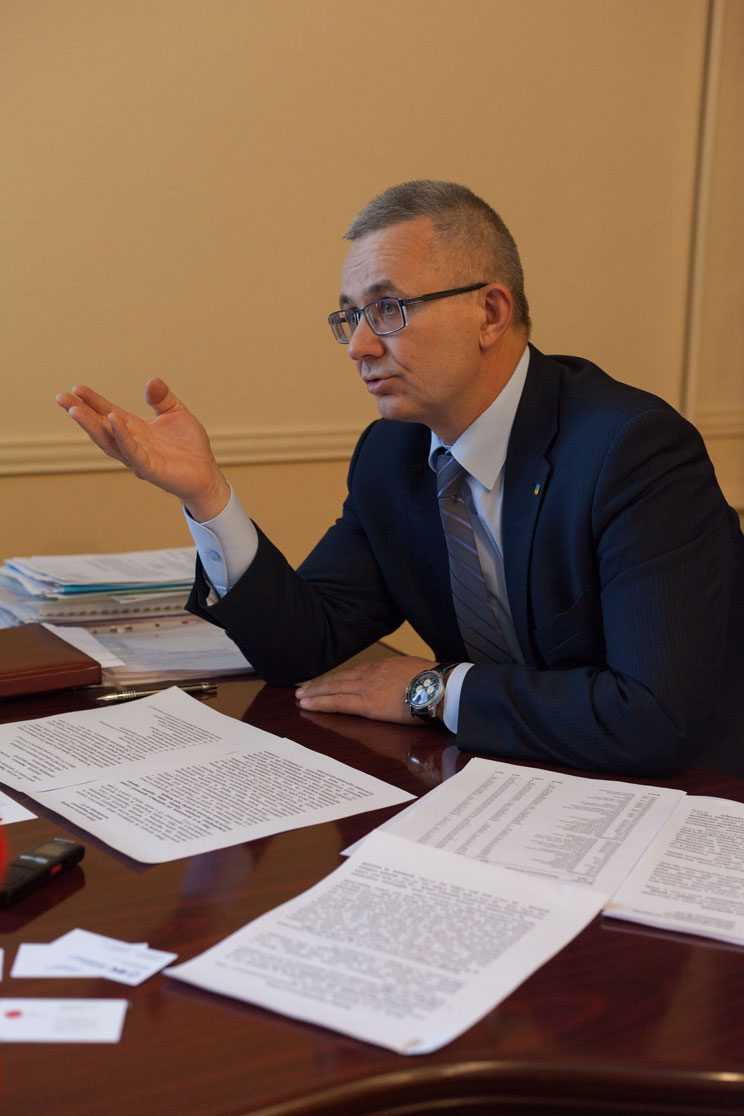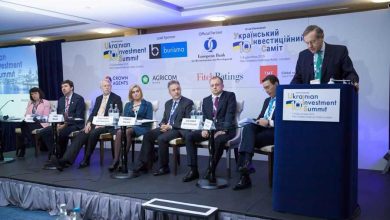Tired of the fairy tales. What companies are eligible for loans from the financial institutions?

In the early noughties the head of International Finance Corporation (IFC) Kiev office Elena Voloshina taught the owners of the Ukrainian companies the big game rules. IFC was looking for the projects to fund in Ukrainian agroindustry. However, it is difficult to get money from this institution as an eligible company must comply with a number of requirements. At the dawn of agricultural holdings forming there were no such companies In Ukraine. To lend out money, Voloshina at first had to advice the local businessmen on what had to be altered radically and what had to be just improved in the structure and development of their companies. It was a close collaboration with IFC, and particularly with Voloshina, that then allowed the largest poltry producer in Ukraine, Yuriy Kosyuk’s holding “Mironovskiy Hlebo Product”, to build the business processes correctly and to conduct IPO on London Stock Exchange without a hitch.

With a capital of $ 889.5 million Kosyuk currently ranks first in the LL magazine’s ranking of the richest farmers. Voloshina makes no disguise of her disappointment. Though she has devoted many years working hard with the local business, there are situations that discredit Ukrainian borrowers. For instance, IFC had allocated big loans to the agricultural holding “Mriya” for several times, the last one was in early 2014 for $65 million. However, a year and a half ago the holding defaulted and reported creditors of the disability to pay off the loan. After this case, IFC has tightened the prospective borrowers’ verification system. Voloshina emphasized this idea in our conversation for several times.
Sergey Chernenko, the Chairman of First Ukrainian International Bank, has not got such disappointments in his practice. FUIB readily lends to the agricultural sector companies. Agriculture is one of the priorities in the bank’s practice. According to the results of the first six months of 2015, the amount of loans which the financial institution has allocated to agrarian companies is about UAH 2.9 billion. In our conversation Chernenko broke a common stereotype that banks are more willing to lend to large holdings than medium-sized agricultural enterprises. However, he admits that hryvna loans are now very expensive for medium-sized businesses.
Yaroslav Krasnopolsky, First Deputy Minister of Agrarian Policy and Food of Ukraine, shared his ideas on how small farms’ owners may join the great agrarian game and even try their hand on the foreign market. Krasnopolsky does not use common official words, he speaks like a man who has a great work experience in medium-sized and large agribusiness. In his resume there is the position of Vice President of Business Development in “Rise” Group, one of the largest and the most successful holdings in Ukraine.
LL: The matter of entering the European market by the Ukrainian agrarian companies has been actively discussed in recent years. However, is it possible to talk about any kind of competition between Ukrainian and foreign farmers? European agrarians can borrow money at 2-5% annually, while in Ukraine the rates are several times higher. Are the financial institutions ready to make advances to the companies intending to enter the European market with their products?

Sergey Chernenko: I will not deny the fact that today the cost of money is very high in Ukraine. High inflation and economic crisis affect the rates. The rates which now often exceed 20% turn out to be unsustainable for many farmers. As a result, the sector seriously lacks funding, and the farmers are forced to seek for alternative sources of funds. Banks, for their part, offer products alternative to loans. For example, we have such product as avalized bills. However, globally it does not solve the problem of the sector underfunding. It requires the state’s systematic support in the form of interest rates compensation, for example.
Elena Voloshina: The problem of the sector is in its significant underfunding. Banks reduce the limits even for their very good and loyal clients. They prolong lines of credit but reduce their size. Or they ask a client to repay the line, and then they submit it under new conditions. This happens due to the macroeconomic situation as well as the difficulties of the banking sector itself. Really, many commercial banks are switching to the documental form of the sector support. The promissory notes using future harvest as collateral are a matter which is being worked hard at by IFC. We have launched a project of the agrarian promissory notes in cooperation with the Ministry of Agrarian Policy. We feel a strong support from the new authorities of the ministry. A pilot project was launched in Poltava region, and then we added three more regions: Kharkov, Vinnitsa and Cherkassy. If to speak about the risks, there are two of them. They are the risk of the country as a whole and the risk of a single project. When financing an exporter, the risk is lower as you grant a loan in foreign currency to the company which has foreign currency earnings. When you finance people who earn hrivna the risk is much higher. Therefore, the cost of financing for an effective exporter will be naturally lower.

LL: Elena, do financial institutions willingly cooperate with Ukrainian agriculture companies? The memories of “Mriya” default are still fresh.
E. V.: Journalists like to rub salt in my wound…
S. Ch.: Not just in yours. In fact, many have this bleeding wound.
LL: We did not mean rubbing sault. We just wonder how commercial banks and organizations, like IFC, have toughened the companies verification procedure after the situation which the Guts’ holding.
E. V: It was toughened greatly. Before that case we used to check companies with a magnifying glass, today we do it with an electronic microscope. Now we check not only financial statements, but also closely examine the company-borrower’s owner, their operational activity and other details.
LL: They say that financial experts have even started visiting fields and enterprises.
E. V.: We performed site visits before, but now we are doing it more often. However, if you believe that the situation with «Mriya» has deterred us from financing the sector, you are wrong. There are many successfully developing companies besides “Mriya” in Ukraine. The country’s agricultural sector has great perspectives.
However, if you believe that the situation with «Mriya» has deterred us from financing the sector, you are wrong
LL: Which projects are you ready to fund, and which ones to provide with loans?
S.Ch.: We can put the question a bit differently. There is always an individual client’s risk which surely depends on one’s propensity to fraud. “Mriya” is unfortunately a sheer fraud. However, such a situation could have happened in any sector, but it just happened in agriculture. It’s another matter that the agricultural sector is highly exposed to such external factors as climate and price. Frankly speaking, if we analyze the past five years, we can see such painful situations as falling of prices for corn and lean years. There are a number of regions, which we call the regions with increased risk for farming. To encourage the banks to support the farmers, it is important to implement protection mechanisms, insurance for farmers. The bankers realize that a client may be really very good. You can own technology, do business according to the best international standards. However, external circumstances you are not able to control can play against your business. The clients have a very low safety margin. We face a situation when even a very good client cannot repay, so we have to implement the unpopular measures related to the debt restructuring, interest acquittal, etc. Of course, when such situations occur frequently it has the most negative impact on the industry attractiveness as a whole.
LL: Yaroslav, is the state ready to guarantee the banks loans repayment?
Yaroslav Krasnopolsky: It is possible to discuss this topic only having adequate financial resources and instruments. The only instrument we have today is the Agricultural Fund that among other matters is engaged in forward procurement. This allows us to finance businesses and purchase grain ensuring country food security. We are working at new instruments that will attract financial resources to the sector. The agrarian promissory notes are a good example of the work. The timely funding of UAH 40million for farmers is a good start. The project has already been functioning in four regions. In September I had a meeting with serious foreign businessmen who are ready to create a fund of $1.5 billion here. The fund is going to invest in projects related to the processing of agricultural products, infrastructure projects and trading. There is an interest and the most important point is that the Ukrainian side has a huge potential. In my opinion, if favorable conditions for the investors are provided, the government will not need to collect insurance proceeds either of UAH300 million or UAH600 million. It is important not to deter the investors.
In September I had a meeting with serious foreign businessmen who are ready to create a fund of $1.5 billion here. It is important not to deter the investors
LL: What are they afraid of now?
J. K.: The risks. Some investors are deterred by them while some are attracted. The risks are forcing companies to operate at high margins and get big profit. The unstable political situation in Ukraine, the conflict in the East and other objective and subjective situations increase the risks. And in value terms it is a high cost of money, which induces the economy to work with high cost effectiveness. Those who have access to cheap financial resources win in this situation.
LL: Even before the conflict, they were not too anxious to establish funds here and invest money.
J. K.: Now I am talking about the investors who were ready to invest into Ukrainian agriculture two years ago. But then the conflict broke out and it interfered with their intentions. They slowed down.
LL: Elena, could you tell us what the investors are afraid of?
E. V.: Much depends on what kind of investor we talk about. There are strategists and financial investors. And the financial investors can be different. Some of them respect risk and understand that it often hides great opportunities. Others, on the contrary, are more conservative and cautious. Yaroslav Vasilievich tells about people who are ready to invest more than a billion dollars. Apparently, they are financial investors. Probably, people who establish the fund do not invest their own money in it, but accumulate the money of several different investors. I dare assume that we are talking about people who are sure that today the Ukrainian economy has reached its lowest level and the assets will never be cheaper than now. An investment at the lowest level is also a good investment, so the root of the problem is not in the political or economic situation. It is much more trivial. The root of the problem is the corruption, which has not disappeared. The solution of this problem can and should be the deregulation. The process has started; it must not be stopped or given up halfway. It must be finished, and every successful story must be widely replicated and investors must be informed about it. For instance, the real stories we see at Ukrainian ports. Formerly, a ship entered a port and had to stay there from 3 hours to several days while a necessary paper was going back and forth. Now a ship calls at a port, is checked-in within 10 minutes, and discharging begins. This is a true story, and it must be told. Not only intentions and perspectives must be spoken about, but real cases. Serious investors think in precise categories, they do not need the tales from the Vienna Woods, they need real cases. However, we do not tell our good stories to the world. Instead, we show our deputies fighting in the Parliament. And after all, we expect people to invest billions here?..
S.Ch.: What we also lack are positive stories from the judicial practice. In fact one can have a great idea, but be exposed to malpractices by the authorities or the Ukrainian partner.
LL: The investment activity has not stopped completely. What businesses and companies are the investors ready to invest in now? Elena, let’s take IFC, who are you ready to cooperate with?
E. V.: In fact, we have a great choice. We can fund even the foreign investors, or invest in Ukrainian companies. We are interested in the whole chain from production (crops, livestock) to the processing of agricultural products and sales, food retail and export infrastructure. The last mentioned is especially important. We understand that with the increase of the production, and the export increase respectively, the capacities for the storage and transshipment of grain, oil, and so on, that are available now, will not be enough. We are ready to help solve this problem.
LL: Sergey, what projects in agriculture is your bank ready to finance at this stage?
S. Ch.: The companies that cultivate from five thousand to fifty thousand hectares of land, the grain producers. As a rule, they have a perfect technology and stability in their work. Such companies have a good margin of safety level even during crisis. There are also projects on the import substitution. The local selection on a number of crops showed very good results. Such projects should be supported as they allow reducing the Ukrainian manufacturers’ dependence on the foreign market prices. A lot of various food supplements which can be easily produced in Ukraine are imported.
LL: Are the banks ready to reduce interest rates to work with ambitious projects?
S. Ch.: Interest rates depend not on the bank itself, but on the market conditions. We are hostages of the same factors: the conflict in the East, and so on. Everyone is waiting for the moment when a clear horizon emerges, when people calm down a little. The positive trend has already been observed. I think that the interest rate normalization will start next year. An important factor influencing interest rates is the situation with the foreign currency. In Ukraine like in any other country the situation with local currency reflects the people’s mood, their belief in macroeconomics and politics.
J. K.: We have a strategy for the agricultural industry development until 2020. When writing this strategy, we worked very hard with experts, engaged scientists and international professionals to work out the correct and the most effective plan of action. We tested each industry separately: in addition to the farming itself and the processing industry we analyzed the fishery and the forestry. Each of them has its own bottleneck. Being aware of where exactly a narrow place is, it is easier to focus, so the government support will work more efficiently. Now we have UAH250 million to support livestock farming. The program of commercial banks’ loans compensation is already working. By December, the agricultural enterprises had attracted additional UAH 3.2 billion of preferential loans. The potential capacity of the program is more than UAH7 billion for the enterprises which annual turnover accounts up to UAH10 million. It is not enough as we would like to support the gardening and the winegrowing industry too. Moreover, there are results of such supporting programs. For instance, Ukraine has managed to reduce four times the import of apples owing to the support of Ukrainian gardening.
LL: The arguments whether large agricultural holdings or small farm enterprises are more necessary for Ukraine can be heard more and more often. What is your opinion?
J.K.: In the Ministry, we are in charge of both of them. We do not think in terms of dividing them into good and bad. We are focused on entering European market. Let us be realistic, small farms cannot do this because neither production volumes nor quality of products suit the market. Big business has the access to the foreign markets. We are interested in it owing largely to such capacity. They provide the foreign currency inflow into the country. In my opinion, it is easier for bankers to cooperate with larger holdings as it is more convenient to work with one client who cultivates 70 000 ha than with seven companies that cultivate 10 000 ha each. The amount of the loan money is the same, but the documents and paperwork are seven times less. The question is what to do with small and medium-sized companies? It is obvious that such enterprises rarely succeed in conducting their business efficiently. One of the possible solutions is to combine farms into cooperatives dealing with logistic, financial and procurement matters together. This system works in Poland. It is much more difficult to implement than it sounds, as we do not even have the culture, which would allow us create it effortlessly. Nevertheless, we are working at it. There is a department in the ministry, which deals with the matters of farmers, small and medium-sized agribusinesses. By the way, farmers work in very promising and profitable sectors of agribusiness. For instance, nuts and berries growing are very profitable sectors.
S. Ch.: As a banker I can say that now on the contrary we are moving from large holdings to medium-sized businesses. Why? They are more stable clients. They obey the rules and follow the standards of business ethics much better. The bigger a business becomes the more often it tries to break the rules.
Text: Irina Chukhleb, Alisa Ilyinskaya






